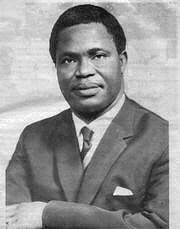
Nnamdi Benjamin Azikiwe, commonly referred to as Zik of Africa, was a Nigerian politician, statesman, and revolutionary leader who served as the 3rd and first black governor-general of Nigeria from 1960 to 1963 and the first president of Nigeria during the First Nigerian Republic (1963–1966). He is widely regarded as the father of Nigerian nationalism as well as one of the major driving forces behind the country's independence in 1960.
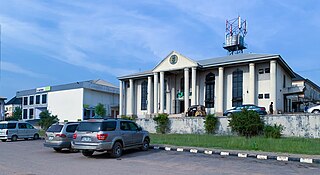
Onitsha is a city on the eastern bank of the Niger River, in Anambra State, Nigeria. Onitsha along with various cities and towns in southern Anambra State, northern Imo State and neighboring Delta State on the western bank of the Niger River, form a continuous metropolitan area.

Anambra State is a Nigerian state, located in the South-eastern region of the country. The state was created on 27 August 1991. Anambra state is bounded by Delta State to the west, Imo State and Rivers State to the south, Enugu State to the east and Kogi State to the north. The State's Capital is Awka, while the State’s Largest City is Onitsha which is regarded as one of the largest metropolis area in Africa. Nnewi is the second largest commercial and industrial city in Anambra State, and also a known automobile hub within Nigeria and Africa.
The National Council of Nigeria and the Cameroons (NCNC) (later changed to the National Convention of Nigerian Citizens), was a Nigerian nationalist political party from 1944 to 1966, during the period leading up to independence and immediately following independence.
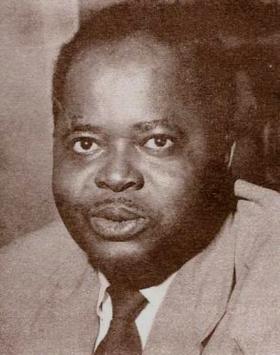
Michael Iheonukara Okpara was a Nigerian politician and Premier of Eastern Nigeria during the First Republic, from 1959 to 1966. At 39, he was the nation's youngest premier. He was a strong advocate of what he called "pragmatic socialism" and believed that agricultural reform was crucial to the ultimate success of Nigeria.

Prince AkwekeAbyssinia Nwafor Orizu (GCON)(; 17 July 1914 – 1999) was a Nigerian Politician, who served as President of the Nigerian Senate from 1963 to early 1966, during the Nigerian First Republic. Orizu was also Acting President of Nigeria from late 1965 until the military coup of January 1966. He was a member of the Nnewi Royal family. His nephew Igwe Kenneth Onyeneke Orizu III is the current Igwe (King) of Nnewi Kingdom. Nwafor Orizu College of Education in Nsugbe, Anambra State, is named after him.

Nnamdi Azikiwe University, Awka, fondly called UNIZIK, is a federal university in Nigeria. It consists of two campuses in Anambra State. Its main campus is in Awka, while its other campus is in Nnewi. There are also other campuses of Nnamdi Azikiwe University, Awka. These include Agulu in Anaocha local government area and Ifite-Ogwuari in Ayamelum local government area in Anambra State. This makes Nnamdi Azikiwe University to operate in the three Senatorial Districts in Anambra State, Nigeria having Awka campus, in Anambra Central Senatorial District, Nnewi in Anambra South Senatorial District and Ifite-Ogwuari in Anambra North Senatorial District, respectively.
Christopher Uchefuna Okeke, also known as Uche Okeke, was an illustrator, painter, sculptor, and teacher. He was an art and aesthetic theorist, seminal to Nigerian modernism.

The First Republic was the republican government of Nigeria between 1963 and 1966 governed by the first republican constitution. The country's government was based on a federal form of the Westminster system. The period between 1 October 1960, when the country gained its independence and 15 January 1966, when the first military coup d’état took place, is also generally referred to as the First Republic. The first Republic of Nigeria was ruled by different leaders representing their regions as premiers in a federation during this period.

Raymond Amanze Njoku was a Nigerian politician and former minister for Transport. The son of an Igbo Chief, he was born in Owerri and raised in a Roman Catholic household. He attended Our Lady's School at Emekuku, for primary education. Later on, at St Charles, college, Onitsha, where he was studying, he applied and won a scholarship that earned him an admission into a teachers training school. After brief stints at tutorship in various schools including St Gregory's College, Lagos and St Charles, Onitsha, he decided to change course and study law. After completing his Law studies at Cambridge: LLB Hons Peterhouse College Cambridge, England; he was called to the bar at Inner Temple.
Sir Louis Phillip Odumegwu Ojukwu, OBE was a Nigerian business tycoon from the Ojukwu family of Nwakanwa quarters Obiuno Umudim Nnewi.
Eyo Ita (1903–1972) was a Nigerian educationist and politician from Creek Town, in present-day Cross River State, who was the leader of the Eastern Government of Nigeria in 1951 and the first Professor Nigeria ever had. He was one of the earliest Nigerian students who studied in the United States instead of the frequent route of studying in the United Kingdom. He was a deputy national president of the National Council of Nigeria and the Cameroons (NCNC) in the late 1940s and early 1950s.
James Ifeanyichukwu Nwobodo is a Nigerian businessman and politician who was governor of Anambra State (1979–1983) during the Nigerian Second Republic and was Senator for Enugu East Senatorial District in Enugu State (1999–2003). In 2003, he ran unsuccessfully in the Nigerian Presidential elections.
The West African Pilot was a newspaper launched in Nigeria by Nnamdi Azikiwe ("Zik") in 1937, dedicated to fighting for independence from British colonial rule. It is most known for introducing popular journalism within Nigeria. The main focus of the newspaper was to promote Nigerian independence from colonial rule. Football was a topic often used within the media to promote these various arguments of independence. With humanistic language and powerful ideas, the West African Pilot successfully promoted the humanity of African workers in this colonized world. The newspaper dismissed the idea that sports and politics are to be separated, further supporting African's connection to the game and adding specific cultural impact to the game itself; this supported a new kind of identity pertinent to the Nigerian people. Through fictional stories and football centered symbolism, the newspaper was even said to have, "created the possibility of a new form of imagined community", setting the stage for how a modern society should be.

Christ the King College, Onitsha (CKC), popularly known as CKC Onitsha, or Amaka Boys, is a Catholic all-boys secondary school in Onitsha, Nigeria. It is ranked the top-ranked high school in Nigeria and 36th in the top 100 best high schools in Africa as of February 2014.
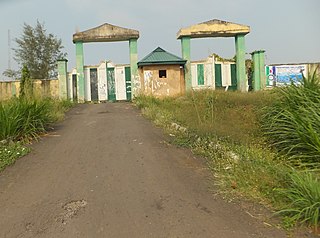
Anaku is one of the administrative divisions of Anambra State, South-Eastern Nigeria. The town lies 6°15' North of the Equator and 6°44' East of the Greenwich Meridian. It is bordered by "Omabala," the native name of the Anambra River, which is a tributary of the River Niger (North), Aguleri, Ezu River (South), Omor and Umuerum communities (East).
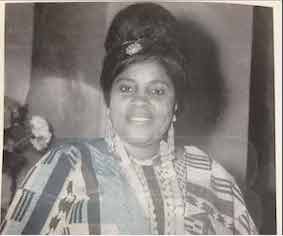
Flora Ogbenyeanu Ogoegbunam Azikiwe was the first wife of Nnamdi Azikiwe, the first President of Nigeria. She served as the first First Lady of Nigeria from 1 October 1963 to 16 January 1966.
Dr. Nkem Okeke is a Nigerian Politician who was the Deputy Governor of Anambra State from 17 March 2014 to 17 March 2022 He first served as Anambra State Commissioner for Economic Planning, and again as Anambra State Commissioner for Works and Transport in the administration of Governor Peter Obi and later went back to immerse himself in academia as Lecturer and Head of Department of Economics at Nnamdi Azikiwe University,Awka.
Michael Oguejiofo Ajegbo was a Nigerian lawyer and politician who was Attorney-General of Nigeria's Eastern Region during Nigeria's First Republic.
Sir Benedict Obidinma Odinamadu was a civil servant. He was the private Secretary to Dr. Nnamdi Azikiwe., Dr. M.I. Okpara while Premiers of Eastern Region of Nigeria respectively and First Secretary to the Military Government of Colonel Emeka Odumegwu Ojukwu.
